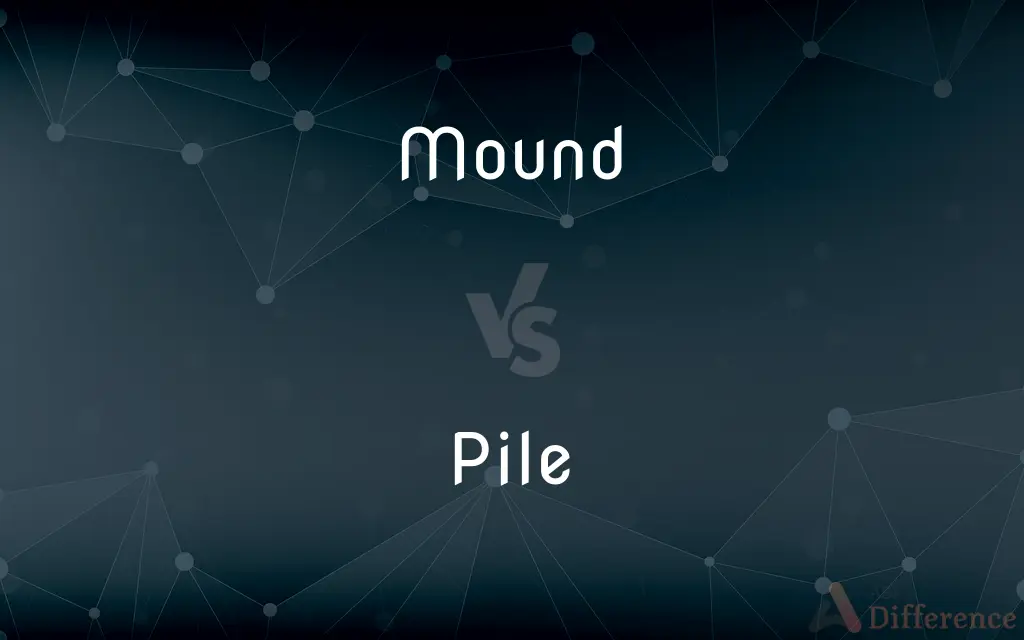Mound vs. Pile — What's the Difference?
By Fiza Rafique & Maham Liaqat — Updated on April 30, 2024
A mound is a structured heap, often of earth or stones, intended for a specific purpose, whereas a pile is a less organized accumulation of items or materials.

Difference Between Mound and Pile
Table of Contents
ADVERTISEMENT
Key Differences
A mound typically refers to a large, structured heap of earth, stones, or similar materials, often created for a specific purpose, such as a burial site or defensive structure. In contrast, a pile refers to a general accumulation of objects or materials heaped together without a deliberate structure.
Mounds are often seen in historical contexts, such as ancient burial mounds or defensive mounds built to protect settlements, highlighting their purpose-driven nature. On the other hand, piles are commonly referenced in everyday situations, like a pile of clothes, books, or leaves, signifying a temporary and often disorganized collection.
The construction of a mound is usually deliberate, involving planning and effort to maintain a specific shape or function, whereas a pile is formed more casually and can be created by simply stacking or gathering items together.
Mounds can be naturally occurring as well, such as ant hills and termite mounds, which are created by animals as part of their habitat. Piles, however, are usually the result of human activity and lack the biological or ecological implications of mounds.
The term "mound" conveys a sense of permanence and significance, often associated with cultural or natural importance, while "pile" implies temporariness and lack of intrinsic structure or purpose.
ADVERTISEMENT
Comparison Chart
Definition
A structured heap, often for a specific use
An accumulation of items, typically disorganized
Context
Archaeological, historical, natural
Everyday, casual contexts
Purpose
Intentional, with specific functions
Generally lacks a specific purpose
Formation
Deliberate and planned
Accidental or casual
Examples
Burial mounds, defensive earthworks
Pile of clothes, pile of rubble
Compare with Definitions
Mound
A deliberately constructed heap, often of earth or stones.
The ancient mound was believed to be a ceremonial site.
Pile
An informal heap of materials or objects.
He added more books to the pile on his desk.
Mound
Used for specific purposes like burials or defenses.
The mound in the village served as a fort during historical conflicts.
Pile
Commonly found in everyday settings.
The pile of laundry was waiting to be washed.
Mound
Can be naturally formed by animals.
The ant mound outside was a complex network of tunnels and chambers.
Pile
Formed casually and often temporarily.
After the party, a pile of dishes was left in the kitchen.
Mound
Symbolizes permanence and historical significance.
Archaeologists studied the mound to uncover its past.
Pile
Lacks a deliberate structure or design.
The construction site was scattered with piles of debris.
Mound
Typically larger and more structured than piles.
The mound at the park was landscaped to enhance its natural beauty.
Pile
Generally smaller and less organized than mounds.
She swept the leaves into a small pile.
Mound
A mound is a heaped pile of earth, gravel, sand, rocks, or debris. Most commonly, mounds are earthen formations such as hills and mountains, particularly if they appear artificial.
Pile
A quantity of objects stacked or thrown together in a heap.
Mound
A rounded mass projecting above a surface
The bushes were little more than vague mounds beneath the snow
Pile
A large accumulation or quantity
A pile of work to do.
Mound
A large pile or quantity of something
A mound of dirty crockery
Pile
A large amount of money
Made a pile in the real estate boom.
Mound
A ball representing the earth, used as part of royal regalia, e.g. on top of a crown, typically of gold and surmounted by a cross.
Pile
A nuclear reactor.
Mound
Heap up into a rounded pile
Basmati rice was mounded on our plates
Pile
A voltaic pile.
Mound
Enclose or fortify with an embankment
A sand-built ridge Of heaped hills that mound the sea
Pile
A very large building or complex of buildings.
Mound
A pile of earth, gravel, sand, rocks, or debris heaped for protection or concealment.
Pile
A funeral pyre.
Mound
A natural elevation, such as a small hill.
Pile
A heavy post of timber, concrete, or steel, driven into the earth as a foundation or support for a structure.
Mound
A group of things collected in a mass or heap
Found his keys in a mound of laundry.
Pile
(Heraldry) A wedge-shaped charge pointing downward.
Mound
Often mounds A great deal; a lot
Has mounds of homework to finish.
Pile
A Roman javelin.
Mound
(Archaeology) A large artificial pile of earth or stones often marking a burial site.
Pile
Cut or uncut loops of yarn forming the surface of certain fabrics, such as velvet, plush, and carpeting.
Mound
(Baseball) The slightly elevated pitcher's area in the center of the diamond.
Pile
The surface so formed.
Mound
(Archaic) A hedge or fence.
Pile
Soft fine hair, fur, or wool.
Mound
To heap into a raised mass
Mounded the dirt around the plants.
Pile
To place or lay in a pile or heap
Piled books onto the table.
Mound
An artificial hill or elevation of earth; a raised bank; an embankment thrown up for defense
Pile
To load (something) with a heap or pile
Piled the table with books.
Mound
A natural elevation appearing as if thrown up artificially; a regular and isolated hill, hillock, or knoll.
Pile
To add or increase to abundance or to a point of burdensomeness
Piled homework on the students.
Mound
(baseball) Elevated area of dirt upon which the pitcher stands to pitch.
The pitcher was waiting at the mound.
Pile
To form a heap or pile.
Mound
A ball or globe forming part of the regalia of an emperor or other sovereign. It is encircled with bands, enriched with precious stones, and surmounted with a cross.
Pile
To move in, out, or forward in a disorderly mass or group
Pile into a bus.
Pile out of a car.
Mound
The mons veneris.
Pile
To drive piles into.
Mound
A hand.
Pile
To support with piles.
Mound
(obsolete) A protection; restraint; curb.
Pile
A mass of things heaped together; a heap.
Mound
(obsolete) A helmet.
Pile
(informal) A group or list of related items up for consideration, especially in some kind of selection process.
When we were looking for a new housemate, we put the nice woman on the "maybe" pile, and the annoying guy on the "no" pile
Mound
(obsolete) Might; size.
Pile
A mass formed in layers.
A pile of shot
Mound
(transitive) To fortify with a mound; add a barrier, rampart, etc. to.
Pile
A funeral pile; a pyre.
Mound
(transitive) To force or pile into a mound or mounds.
He mounded up his mashed potatoes so they left more space on the plate for the meat.
Pile
(slang) A large amount of money.
He made a pile from that invention of his.
Mound
(intransitive) To form a mound.
Pile
A large building, or mass of buildings.
Mound
A ball or globe forming part of the regalia of an emperor or other sovereign. It is encircled with bands, enriched with precious stones, and surmounted with a cross; - called also globe.
Pile
A bundle of pieces of wrought iron to be worked over into bars or other shapes by rolling or hammering at a welding heat; a fagot.
Mound
An artificial hill or elevation of earth; a raised bank; an embarkment thrown up for defense; a bulwark; a rampart; also, a natural elevation appearing as if thrown up artificially; a regular and isolated hill, hillock, or knoll.
To thrid the thickets or to leap the mounds.
Pile
A vertical series of alternate disks of two dissimilar metals (especially copper and zinc), laid up with disks of cloth or paper moistened with acid water between them, for producing a current of electricity; a voltaic pile, or galvanic pile.
Mound
To fortify or inclose with a mound.
Pile
A beam, pole, or pillar, driven completely into the ground.
Mound
(baseball) the slight elevation on which the pitcher stands
Pile
An atomic pile; an early form of nuclear reactor.
Mound
A small natural hill
Pile
(obsolete) The reverse (or tails) of a coin.
Mound
A collection of objects laid on top of each other
Pile
A list or league
Mound
Structure consisting of an artificial heap or bank usually of earth or stones;
They built small mounds to hide behind
Pile
(obsolete) A dart; an arrow.
Mound
The position on a baseball team of the player who throws the ball for a batter to try to hit;
He has played every position except pitcher
They have a southpaw on the mound
Pile
The head of an arrow or spear.
Mound
Form into a rounded elevation;
Mound earth
Pile
A large stake, or piece of pointed timber, steel etc., driven into the earth or sea-bed for the support of a building, a pier, or other superstructure, or to form a cofferdam, etc.
Pile
(heraldry) One of the ordinaries or subordinaries having the form of a wedge, usually placed palewise, with the broadest end uppermost.
Pile
A hemorrhoid.
Pile
Hair, especially when very fine or short; the fine underfur of certain animals. (Formerly countable, now treated as a collective singular.)
Pile
The raised hairs, loops or strands of a fabric; the nap of a cloth.
Pile
To lay or throw into a pile or heap; to heap up; to collect into a mass; to accumulate
They were piling up wood on the wheelbarrow.
Pile
(transitive) To cover with heaps; or in great abundance; to fill or overfill; to load.
We piled the camel with our loads.
Pile
(transitive) To add something to a great number.
Pile
(transitive) (of vehicles) To create a hold-up.
Pile
To place (guns, muskets, etc.) together in threes so that they can stand upright, supporting each other.
Pile
(transitive) To drive piles into; to fill with piles; to strengthen with piles.
Pile
(transitive) To give a pile to; to make shaggy.
Pile
A hair; hence, the fiber of wool, cotton, and the like; also, the nap when thick or heavy, as of carpeting and velvet.
Velvet soft, or plush with shaggy pile.
Pile
A covering of hair or fur.
Pile
The head of an arrow or spear.
Pile
A large stake, or piece of timber, pointed and driven into the earth, as at the bottom of a river, or in a harbor where the ground is soft, for the support of a building, a pier, or other superstructure, or to form a cofferdam, etc.
Pile
One of the ordinaries or subordinaries having the form of a wedge, usually placed palewise, with the broadest end uppermost.
Pile
A mass of things heaped together; a heap; as, a pile of stones; a pile of wood.
Pile
A mass formed in layers; as, a pile of shot.
Pile
A funeral pile; a pyre.
Pile
A large building, or mass of buildings.
The pile o'erlooked the town and drew the fight.
Pile
A vertical series of alternate disks of two dissimilar metals, as copper and zinc, laid up with disks of cloth or paper moistened with acid water between them, for producing a current of electricity; - commonly called Volta's pile, voltaic pile, or galvanic pile.
Pile
The reverse of a coin. See Reverse.
Pile
To drive piles into; to fill with piles; to strengthen with piles.
Pile
To lay or throw into a pile or heap; to heap up; to collect into a mass; to accumulate; to amass; - often with up; as, to pile up wood.
The labor of an age in piled stones.
Pile
To cover with heaps; or in great abundance; to fill or overfill; to load.
Pile
A collection of objects laid on top of each other
Pile
(often followed by `of') a large number or amount or extent;
A batch of letters
A deal of trouble
A lot of money
He made a mint on the stock market
It must have cost plenty
Pile
A large sum of money (especially as pay or profit);
She made a bundle selling real estate
They sank megabucks into their new house
Pile
Fine soft dense hair (as the fine short hair of cattle or deer or the wool of sheep or the undercoat of certain dogs)
Pile
Battery consisting of voltaic cells arranged in series; the earliest electric battery devised by Volta
Pile
A column of wood or steel or concrete that is driven into the ground to provide support for a structure
Pile
The yarn (as in a rug or velvet or corduroy) that stands up from the weave;
For uniform color and texture tailors cut velvet with the pile running the same direction
Pile
A nuclear reactor that uses controlled nuclear fission to generate energy
Pile
Arrange in stacks;
Heap firewood around the fireplace
Stack your books up on the shelves
Pile
Press tightly together or cram;
The crowd packed the auditorium
Pile
Place or lay as if in a pile;
The teacher piled work on the students until the parents protested
Common Curiosities
What is a pile?
A pile refers to an accumulation of items heaped together without a specific structure.
Can mounds be naturally occurring?
Yes, mounds like ant hills or termite mounds are naturally formed by animals.
Are piles always man-made?
While piles are often the result of human activity, they can include naturally accumulated materials.
What are some examples of mounds?
Examples include burial mounds, defensive earthworks, and ant hills.
Is a mound always larger than a pile?
Not necessarily, but mounds are generally more substantial and structured compared to piles.
What is a mound?
A mound is a structured heap often made for specific purposes such as historical or natural functions.
How does the formation of a mound differ from a pile?
Mounds are deliberately planned and shaped, while piles are more casually formed.
What are some examples of piles?
Examples include piles of clothes, books, leaves, or rubble.
Can a pile have a specific purpose?
While typically not purpose-driven, piles can be used for temporary storage or organization.
Why might someone create a mound?
Mounds are created for functions like defense, ceremonial purposes, or as part of ecological habitats for certain animals.
Do piles require planning?
Piles usually do not require planning and are formed more spontaneously.
Share Your Discovery

Previous Comparison
Ephah vs. Homer
Next Comparison
Syllepsis vs. ZeugmaAuthor Spotlight
Written by
Fiza RafiqueFiza Rafique is a skilled content writer at AskDifference.com, where she meticulously refines and enhances written pieces. Drawing from her vast editorial expertise, Fiza ensures clarity, accuracy, and precision in every article. Passionate about language, she continually seeks to elevate the quality of content for readers worldwide.
Co-written by
Maham Liaqat















































